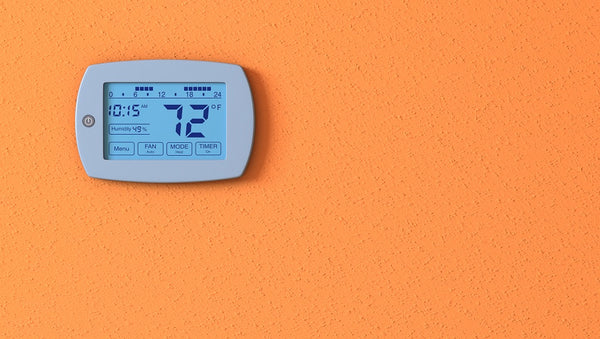
Do you want to have the cleanest air in your home? Indoor air pollution is one of the main causes of such health problems as respiratory diseases, heart conditions, and cancer.
But an HVAC system won’t be enough to ensure a healthy environment. If you take indoor air quality seriously, you need to understand the difference between an air purifier vs. air filter.
Now, what is the difference between an air filter and an air purifier? Stick with us to learn what will work best for you.
Table of Contents
Differences Between Air Filter and Air Purifiers
Air purifiers and air cleaners are crucial for indoor air quality. However, they have different working principles.
Let’s see what they do in greater detail.
Air Filters

What Is an Air Filter?
An air filter is an accessory for HVAC (heating, ventilation, and air conditioning) systems with two goals. The first goal of all air filter types is to keep HVAC systems clean and prolong their service life. The second one is to filter airborne pollutants.
In other words, air filters impact the effectiveness of your air conditioning equipment and the air quality.
Types of Air Filters
Air filters provide varying levels of filtering efficiency. You can choose an optimal air filter based on its minimum efficiency reporting value (MERV). The MERV rating ranged from 1 to 16, with a higher value indicating better filtering performance.
Some of the most common home air filter types with good MERV rating include:
- Electrostatic. One of the cheapest options that remove pollutants with an electrostatic charge.
- Activated carbon. A common solution for trapping volatile organic compounds, odors, and gaseous pollutants. However, these filters can struggle against larger specks of dust and mold spores.
- Washable filters. A long-lasting and cost-effective solution for HVAC systems that require regular cleaning.
- HEPA. High-efficiency particulate air filters with a 16 MERV rating. They trap over 99.97% of particles as small as 0.3 microns. Despite being costly, these filters work excellent for homes and commercial buildings.
How Does Air Filter Work

The air filter is usually located in the HVAC system between the air handler and the air return duct. The filter’s objective is to trap microscopic pollutants before they reach rooms in your house.
The air filter working principle is simple. When you turn on the HVAC, the air gets drawn into the duct. The filter works as a barrier between the duct and your vent, trapping air pollutants from entering your home.
Do I Need Air Filters?
Air filters protect your home from such airborne particles as:
- Dust
- Powder
- Pollen
- Mold
- Bacteria
- Smoke
- Odors
Moreover, air filters will keep your HVAC system cleaner, further prolonging the equipment’s service life.
But you need to remember that high-quality air filters won’t guarantee clean air. These accessories require regular maintenance to retain their filtering efficiency. Furthermore, you’ll have to replace them after a specific service period.
You shouldn’t rely solely on air filters. If you want the best possible air quality, we recommend using additional air cleaning equipment.
Air Purifiers

What Is an Air Purifier?
An air purifier is a device that cleans the air from inside the house. This device improves the air indoor air quality and produces fresher indoor air.
Air purifiers work differently from air filters. Whereas filters trap pollutants from entering the HVAC system, an air purifier removes contaminants that have found their way into your home.
Types of Air Purifiers
Purifiers offer different air purification efficiencies based on the MERV value (you can read about it above).
What’s the best type of air purifier for you? Let’s look at the most popular devices:
- Ionic. These devices create charged ions that attach to pollutants, making them so heavy that they fall to the ground. Ionic purifiers are effective against most types of air pollution, except for odors.
- Activated carbon (absorbent). Absorbent purifiers work against odors, smoke, and gasses. On the downside, activated carbon equipment purifiers are less effective against dust and mold.
- Ultraviolet (UV). UV technology uses light to remove viruses from the air. These devices are extremely useful when used in conjunction with other purifiers.
How Air Purifier Works

Air purifiers cleanse the indoor air from contaminants and work differently based on their types.
Activated carbon air purifiers draw in the air through its fans and trap harmful particles in the filters. Afterward, a fan blows the purified air back into the room.
Ultraviolet and Ionic devices have another working principle. Instead of filtering the bacteria, these purifiers clean the air with special light bulbs and charged ions.
Do I Need Air Purifiers?
Air purifiers can neutralize most types of dangerous pollutants from the air:
- Dust
- Mildew and mold
- Bacteria and viruses
- Fibers
- Pollen
- Ash
- Soil
- Powder
- Smokes
- Odors
- Gaseous pollutants
Air purifiers can relieve symptoms of respiratory disease, neutralize unpleasant odors, and improve sleep quality.
But remember that air purifiers are effective against different pollutants. We recommend getting a UV or Ionic purifier for bacteria and an activated carbon purifier for odors and smokes for the best results.
Cheap devices will generate a significant amount of ozone that can cause damage to your respiratory system. Therefore, you should get high-quality equipment to reap all benefits of air purifiers without their downsides.
What Is an Air Cleaner?

Many companies tend to confuse the term “air purifier” and “air cleaner.” Although they have the same goal, these devices are slightly different.
Most air purifiers clean the air “remotely” with an ultraviolet light or charged ions. The UV devices neutralize bacteria, while Ionic purifiers weigh the pollutants down to the ground.
On the other hand, air cleaners are powered by a fan that draws in the air and filters the pollution. In short, cleaners work like mini-HVAC systems.
HEPA is the most popular type of air cleaner for homes. These devices remove most airborne pollution in the air, down to the microscopic specs of dust. However, HEPA air cleaners are not as effective against odors. You should also regularly maintain and replace the filters inside.
Air Filter vs. Air Purifier — What Should I Buy?

Air filters and air purifiers have different functions, but they share the same goal — to improve indoor air quality.
Air filters allow the HVAC systems to work more efficiently, improving the quality of air that comes into your house from outside. Moreover, filters reduce the wear of your air conditioning equipment.
Air purifiers and cleaners eliminate harmful pollutants from inside your home. They also remove bacteria, viruses and neutralize unpleasant odors.
Comparing air filters vs. purifiers is useless if you want to breathe the cleanest air. We recommend getting both to take your indoor air quality to the maximum.
Conclusion
Now you should know the differences between air filters, purifiers, and cleaners. All of them are crucial if you want to enjoy the freshest and purest air while in your home.
Blackhawk Supply offers the best selection of high-quality air filters, commercial purifiers, and HVAC equipment. Buy now!


